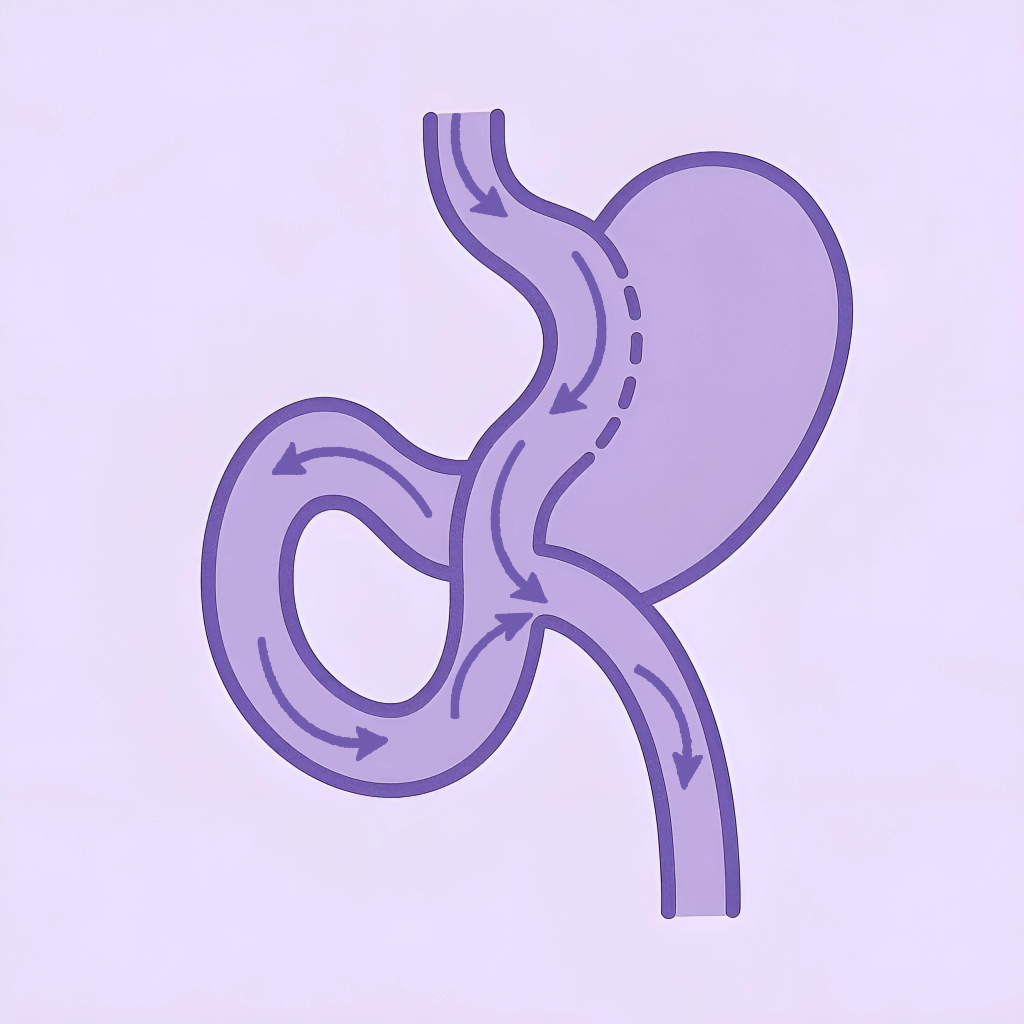Rektumkrebs
%201.svg)






Rektumkrebs ist eine Krebsart, die im Rektum beginnt und sich häufig aus Polypen entwickelt.
Überblick
Das Rektumkarzinom ist eine Form von Krebs, die im Rektum – dem letzten Abschnitt des Dickdarms – entsteht. Es beginnt am Ende des Kolons und reicht bis zum After. Obwohl Kolon- und Rektumkarzinome oft unter dem Begriff kolorektales Karzinom zusammengefasst werden, unterscheiden sich die Behandlungsansätze, da das Rektum in einem engen Bereich nahe anderer Organe liegt.
Mehrere Faktoren erhöhen das Risiko für Rektumkrebs. Das Alter ist ein wesentlicher Risikofaktor – die meisten Fälle treten bei Menschen über 50 Jahren auf. Eine familiäre Vorgeschichte von kolorektalem Krebs oder vererbte Erkrankungen wie das Lynch-Syndrom oder die familiäre adenomatöse Polyposis (FAP) erhöhen ebenfalls das Risiko. Lebensstilfaktoren wie eine ballaststoffarme, fettreiche Ernährung, Rauchen, übermäßiger Alkoholkonsum, Übergewicht und Bewegungsmangel begünstigen ebenfalls die Entstehung. Auch bestimmte Erkrankungen wie chronisch-entzündliche Darmerkrankungen (z. B. Morbus Crohn oder Colitis ulcerosa), Diabetes oder frühere Bestrahlung des Bauchraums können das Risiko steigern.
Symptome & Diagnose
Die Symptome von Rektumkrebs treten häufig erst in fortgeschrittenen Stadien auf. Zu den häufigsten Beschwerden gehören:
Veränderungen der Stuhlgewohnheiten
Rektale Blutungen
Dunkles, weinrotes oder hellrotes Blut im Stuhl
Ungewollter Gewichtsverlust
Bauchschmerzen
Müdigkeit und Schwächegefühl
Dünn geformter Stuhl
Das Gefühl, den Darm nicht vollständig entleeren zu können
Zur Diagnostik wird in der Regel eine Koloskopie (Darmspiegelung) durchgeführt. Dabei wird ein flexibler Schlauch mit einer Kamera verwendet, um Rektum und Dickdarm zu untersuchen. Wenn verdächtige Veränderungen festgestellt werden, wird eine Biopsie durchgeführt – dabei wird Gewebe entnommen und im Labor untersucht.
Weitere bildgebende Verfahren wie MRT, CT oder PET-Scan helfen dabei, das Stadium und die Ausbreitung des Tumors zu bestimmen. Blutuntersuchungen, insbesondere der CEA-Wert (Carcinoembryonales Antigen), können zur Verlaufskontrolle und Bewertung des Therapieansprechens genutzt werden.
Behandlung
Die Behandlung des Rektumkarzinoms besteht meist aus einer Kombination von Operation, Chemotherapie und Strahlentherapie.
Die chirurgische Entfernung des Tumors ist in der Regel der wichtigste Schritt. Ziel ist es, den Tumor möglichst vollständig zu entfernen und gleichzeitig die Darmfunktion zu erhalten.
Eine Chemotherapie kann vor der Operation (neoadjuvant) zur Verkleinerung des Tumors oder nach der Operation (adjuvant) zur Zerstörung verbliebener Krebszellen eingesetzt werden.
Die Strahlentherapie wird insbesondere bei größeren oder schwer operierbaren Tumoren angewendet.
In fortgeschrittenen Fällen kommen auch zielgerichtete Therapien oder Immuntherapien zum Einsatz, die gezielt Krebszellen angreifen oder das Immunsystem stärken. Bei nicht heilbaren Stadien kann eine palliative Behandlung zur Linderung von Beschwerden und Verbesserung der Lebensqualität erfolgen.
Operationsdetails
Bei der Operation wird das betroffene Rektumsegment zusammen mit benachbarten Lymphknoten entfernt, um eine Ausbreitung zu verhindern.
Der Eingriff erfolgt unter Vollnarkose.
Es wird ein Bauchschnitt gemacht oder eine laparoskopische (minimalinvasive) Technik angewendet.
Je nach Tumorlage wird eine tiefe vordere Resektion (low anterior resection) oder eine abdominoperineale Resection durchgeführt.
Nach Entfernung des Tumors wird entweder der Verdauungstrakt wieder verbunden (Anastomose) oder ein künstlicher Darmausgang (Stoma) angelegt.
Genesung & Nachsorge
Die Erholungszeit hängt vom Umfang der Operation ab. In der Regel bleiben Patient:innen einige Tage im Krankenhaus. Zunächst erfolgt eine schrittweise Umstellung von Flüssignahrung auf feste Kost. Mögliche Beschwerden wie Schmerzen, Müdigkeit oder vorübergehende Veränderungen der Stuhlgewohnheiten sind normal und gut behandelbar.
Die Nachsorge umfasst:
Schmerztherapie
Ernährungsberatung
Regelmäßige Kontrolluntersuchungen
Patient:innen mit einem Stoma erhalten spezielle Schulungen und Unterstützung. Für Betroffene, bei denen sich die Darmfunktion verändert hat, gibt es langfristige Betreuung und Hilfestellungen zur Verbesserung der Lebensqualitätt
Haben Sie Fragen zu Ihrer Behandlung?

Häufig gestellte Fragen
Hier finden Sie klare Antworten auf die am häufigsten gestellten Fragen.
Benötigen Sie individuelle Unterstützung? Kontaktieren Sie uns über WhatsApp – wir antworten in der Regel innerhalb weniger Minuten.
In welchen Operationen ist Dr. Gül spezialisiert?
Warum die Türkei für chirurgische Eingriffe wählen?
Wie lange dauert die Genesung nach den meisten Operationen?
Welche bariatrischen Verfahren werden in der Klinik angeboten?
Wie viel Gewicht kann ich nach einer bariatrischen Operation erwarten, zu verlieren?
Welche Sprachen spricht Dr. Gül und sein Team?
Muss ich nach einer bariatrischen Operation Nahrungsergänzungsmittel einnehmen?
Deckt die Versicherung diese Verfahren ab?
Kann ich Behandlung mit einer Reise in die Türkei kombinieren?
Welche Unterstützung ist nach der Operation verfügbar?
Unsere Expertise

Hülsengastrektomie
Minimalinvasive Operation zur langfristigen Gewichtsreduktion mit einem einfachen Verfahren und ohne Umleitung.

Mini-Magenbypass
Einfacherer, weniger invasiver Magenbypass für signifikante Gewichtsabnahme und Diabeteskontrolle.

Magenballon
Eine nicht-chirurgische, vorübergehende Option zur moderaten Gewichtsabnahme ohne bleibende Magenveränderungen.
Folgen Sie Dr. Gül auf Instagram





